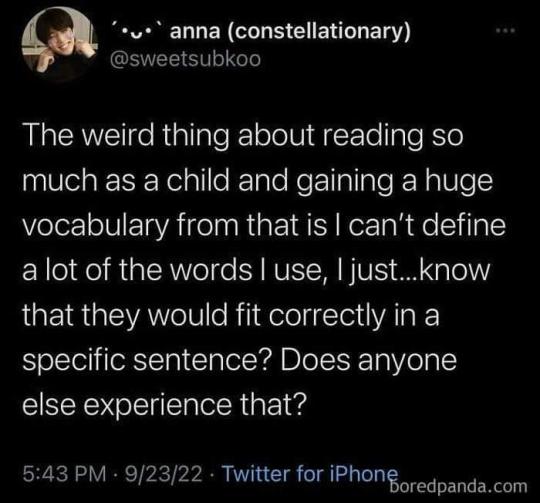Text
Really well put. Similarly the "discourse" (not that there really is any) around whether or not chat is a fourth person pronoun is stupid because it takes place within the context in which actual linguistic terminology is relevant. I mean the whole point of that claim is to be like "ooh never before seen linguistics concept" rather than "this is a useful term for an everyday context"
Someone trying to say that chat is a fourth person pronoun within that context is essentially equivalent to arguing that pluto is a planet within the IAU criteria which is just provably wrong
The IUCN criterion used to exclude Pluto and the other dwarf planets–that they don't clear their orbits–is very useful if you're studying how stellar systems form and evolve. From that perspective, the eight major planets really are in a different class from any other bodies in the solar system, and probably deserve their own name. But if you're doing "planetary" science–i.e. studying the bodies themselves–then it's completely irrelevant. As far as anyone knows, the size you have to be to clear your orbit doesn't form any kind of natural boundary where the dynamics of geology or atmospheric chemistry abruptly change. For that matter, one of the other IUCN criteria, that you have to be orbiting the sun directly, is also not that relevant.
This is the crux of why terminological conventions shouldn't be treated the same as other kinds of scientific knowledge. Even if you can make the claim that the convention is in some sense objective, it will still be contextual. Statements about utility always are. Statements of scientific fact, on the other hand, should at least be true (if not relevant) in any context, regardless of by what means or within what discipline they were discovered.
88 notes
·
View notes
Text
まこ "Mako"
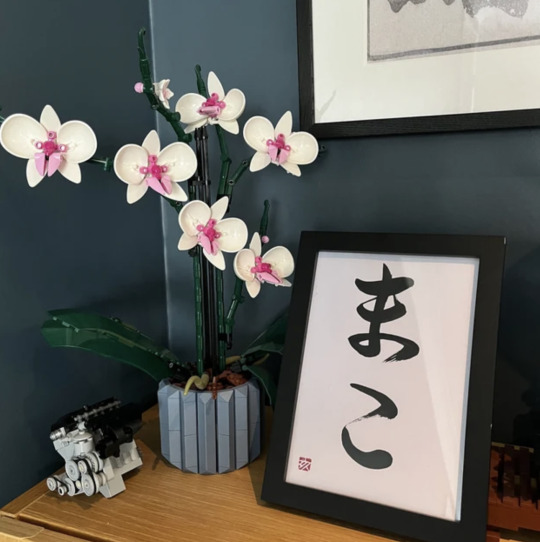
(image by client)
I was very honoured to receive a commission to create this artwork. "Mako" is the name of the client's beloved cat.
I love cats >^^<
The name "Mako" is the nickname of the Japanese actor Makoto Iwamatsu. Because it is a Japanese name, I decided to render it in hiragana.
Hiragana is one of Japan's three writing systems. It contains about 50 elegant, round characters, and is a syllabary, meaning that each character represents a phonetic sound rather than (in the case of kanji) a meaning.
Hiragana is used for:
Short versions of names (such as "Mako" above).
2. Writing a word that you have forgotten the kanji for (common with children and foreigners!).
For example, "cat" in kanji is 猫. You can also write it phonetically in hiragana: ねこ.
3. Verb conjugations. The kanji represents the verb, and the hiragana that comes after it changes depending on whether it's affirmative, negative, present tense, past tense, etc.
Example:
食べる = eat (present/future)
食べた = ate (past)
(食 is the kanji for "to eat", and the characters after it are hiragana).
4. Adjective conjugations. In Japanese, adjectives conjugate too, in a similar way to verbs.
If you're interested in owning your own custom-made calligraphy artwork, please feel free to get in touch. More details here.
19 notes
·
View notes
Text

A plant whose sprout refuses to mature, while its roots grow larger and larger
this was a quick drawing based on an autogenerated pixel prompt! (middle right) I might do the other prompts from this grid at some point too
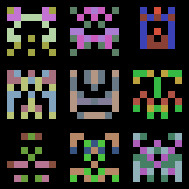
6 notes
·
View notes
Text
Look, I knew five languages by age 19 and now I am learning like 3 more. I work as a language instructor and a consultant. If I can give language learners only one advice, this is it.
STOP LEARNING WORDS ON THEIR OWN.
You're doing yourself a disservice by learning lists of "30 words you must know!" "100 most common words!" like it literally means nothing if you cannot use those words in an appropriate context with proper grammar. So what you actually need to do is learn those words via example sentences.
Of course, sentences have more words so you may think you're learning less but you're actually learning the way to use it in context. That's what's important.
Language is about communication, which also means if you want to learn languages, you have to observe how people communicate with each other universally. Native speakers never have a list of words they know and they don't count every single new word they've learned. So why are you doing it to yourself? What native speakers do is listen to the new word, remember the context they're spoken in, and keep using that word in that context. And that's why people go "wait, you can use that word LIKE THAT?" all the time. So you, a language learner, are also allowed to do that. I'm not even saying those word lists are useless but they're the most useful AFTER you've known most of them and are trying to go over them for practice etc. Native speakers do click on those word lists to check out how many words they don't know or to remind themselves of those words or to learn some facts about each word. That should be your goal as well.
Learn sentences. Learn them in context. Do not fall into the "I must know xx amount of words or I'm a failure at language learning" trap perpetuated by bloggers or youtubers or whatever. Have fun with it!
294 notes
·
View notes
Text
going through a weird few weeks where everything that is usually good is bad and everything that's usually bad is good
1 note
·
View note
Note
Sorry to bother you!
I hope I can formulate my question correctly. I read somewhere that there is a difference in meaning between the words himo and gigolo. Alphonse implies that he was indeed paid for sexual services. Himo, on the other hand, implies that he is unemployed and is extorting money from the woman he lives with. Are Himo and Alphonse the same word or do they have different meanings?
Thanks for the ask! And just as an aside my ask box is always open, I love getting asks
I wasn’t super familiar with the term ジゴロ, but I am familiar with ヒモ. They are both quite different concepts with different connotations.
ヒモ is basically a parasite boyfriend. Not necessarily extorting money, but the stereotypical image is a slobbish guy who doesn’t leave the house, while his girlfriend works. They might have sex, they might not. Usually the relationship doesn’t start like that - maybe one day the guy loses his job and just never gets a new one or something, and the relationship just kind of devolves into that. ヒモ in its original meaning means “string” 🧵 It is a reference to how goldfish poo looks like a string that just drags along after the fish - the deadbeat boyfriends are the poo getting dragged along by the girlfriends (I’m not sure if this stereotype is exclusive to straight couples but I’ve personally only ever seen it in reference to straight couples)
ジゴロ seems to be a kind of male sex worker. Maybe closer to a sugar baby than a prostitute? But definitely different from a ヒモ, since they are actively working, and probably visit multiple customers rather than just the one girlfriend. They’re exchanging sex for money. ヒモ don’t exchange anything for anything, they just leech.
5 notes
·
View notes
Text
The difference between あのー and えーっと
As I touched on in my japanese goncharov post, it’s amazing how much novel research, entertainment, and art are locked behind a language barrier. Even though as english speakers, we are privileged to have many things translated into our language, it’s a simple fact that most things will not be translated into most languages.
I am a huge fan of ゆる言語学ラジオ, a japanese podcast about linguistics. The hosts recently released a book, 言語沼, which goes into detail about some of the subconscious rules native japanese speakers follow but aren’t consciously aware of (an english equivalent might be that adjective-ordering rule we follow e.g. big brown cow, not brown big cow). I’m finding it fascinating, and I wanted to discuss some of it here in english, because I think people learning japanese would find some of these things really useful. It’d be a shame if this knowledge stayed stuck behind the japanese language barrier when the people who would find it the most useful can’t speak japanese fluently enough to read it!
The book talks about how most Japanese people will think of 「あのー」 and 「えーっと」 as having the exact same meaning - they’re both “meaningless” filler words. Despite their belief that they’re the same, those same native speakers will subconsciously only use あのー in one particular type of situation and 「えーっと」 in another, and even feel confused or annoyed if they hear another speaker use one in the wrong context.
So what’s the actual difference? 「えーっと」 is used when the speaker is taking time to remember or solve something. For example, the following exchange is very natural:
Person A: 7 x 5は?
Person B: えーっと、35だ
This makes it a pretty versatile filler word! You can use it pretty much anywhere. Another example would be when you’re talking to yourself, trying to remember where you left your keys.
えーっと、鍵どこ置いたっけ?
On the other hand, あのー is much more specific. It can only be used when you’re taking time to figure out the best way to phrase something. For example, when you’re trying to get a stranger’s attention.
あのー、ちょっといいですか?
In contrast, if Person A was addressed with 「えーっと、ちょっといいですか?」by Person B, they’d feel it was rude because instead of considering how to say something, B is considering what to say, which gives the impression that they hadn’t even figured out what they needed to ask before addressing Person A.
This gives 「あのー」 a more ”polite” feeling than 「えーっと」, even though neither is actually more polite than the other. They’re just used in different circumstances.
Let’s quickly look at the example with the lost keys again. If you replace the filler word:
あのー、鍵どこ置いたっけ?
It is very unnatural. The authors of the book jokingly say that it sounds like you’re talking to a ghost, because 「あのー」 is only used when you’re figuring out how to phrase something, and you wouldn’t worry about that if you’re talking to yourself.
Also, did you know even japanese children properly use each filler word in the correct situation? Despite almost all japanese people (even as adults) being unaware of this rule, they’re subconsciously abiding by it even as children - just from listening to their parents follow the same rules!
It really is amazing how good your subconscious mind is at acquiring language, and how terrible your conscious mind is at it. If you’re not already, I highly recommend integrating a lot of simple language content (e.g. youtube, kids shows, etc) into your study routine - listening to people talk is simply the fastest way to become fluent in your target language.
#langblr#japanese#language learning#language acquisition#japanese language#language#linguistics#learning japanese#japanese grammar#jimmy blogthong
231 notes
·
View notes
Text
I’ve been having trouble putting this idea into words so you’ll have to bear with me, but I was struck when I saw a Japanese news program interviewing foreign tourists in Japan, and some australian women were dubbed over with a stereotypically feminine speech register (lots of のs and わs), and my first thought was “they weren’t speaking that femininely in english”.
A friend of mine from the UK recently mentioned that he noticed that australia has a generally more masculine culture than england - he felt that everyone is a bit more masculine here, including women. This kind of confirmed to me that my impressions of the dubbing were right - the tourists were speaking in a relatively (internationally) more masculine way. Yet their dub made them sound so much more feminine.
It made me wonder. When translating something, do you translate the manner of speaking “directly”, or “relatively” in terms of cultural norms? Maybe this graph will help me explain the question.
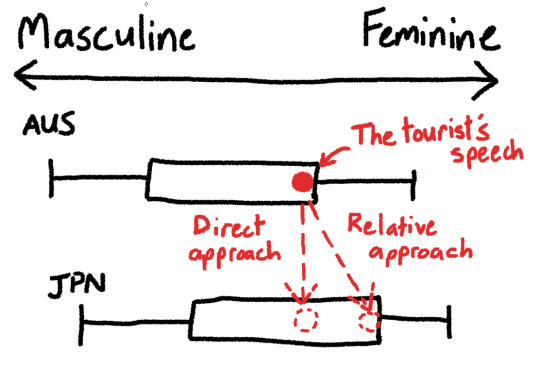
A direct appoach in this case might appear to a Japanese person to result in an unexpectedly masculine register, but preserves how the speaker's cultural upbringing has influenced their speech.
The news program translators chose the relative approach - I think I would prefer the direct approach. I think I prefer it because I believe translation should be a rewriting of the original utterance as if the speaker was originally speaking the target language, and the direct approach compliments that way of thinking the best.
Actually now that I type that, I’m second guessing myself. Does it? It does, if for the purposes of the “rewrite it as if they spoke japanese” thought experiment, we suppose the speaker magically learned japanese seconds before making the utterance, but what if we suppose the speaker magically grew up learning japanese - then maybe they would conform to the relative cultural values. But also, maybe they would never have said such a thing in the first place - their original utterance was informed by their upbringing and cultural values, so how could you possibly know what they would have said if they had known japanese from birth? Maybe my initial instinct was right after all?
If you work in translation, I’m very interested to hear if you have come across this problem and how you deal with it 🙏
Further reading: I think this question also ties into this problem I’ve been struggling to answer for a while.
634 notes
·
View notes
Photo

Japanese typography
#天気が... メンヘラ?#my native partner got it immediately#i guess this is the equivalent of those english words written with kanji/katakana
23 notes
·
View notes
Text
The 6 Differences Between は and が
DIFFERENCE 1
The important fact is AFTER は
• この犬は私のベットです。This dog is my pet.
You want to emphasize that this is not a stray dog. It is not someone else's pet dog. It is MY PET. So anything comes after は is the main part you want the listener to pay attention to.
The important fact is BEFORE が
• この犬が私のベットです。This dog is my pet.
You want to emphasize that THIS IS THE DOG that is my pet. Not other dogs. Imagine you're at a park and there are 3, 4 other dogs playing together with your dog and you want to tell your friend that THIS DOG is the one that is your pet dog, other dogs are not yours. So, what comes before が is the main part you want to tell the listener.
More examples:
• このケーキはおいしいです。This cake is DELICIOUS! (You want to tell your friend that this cake is indeed very good. Your emphasis falls on おいしい, so you use は, because the important fact is AFTER は.
• このケーキがおいしいです。THIS CAKE is delicious. (You want to tell your friend that among all the cakes on the buffet table, this particular cake you are pointing to is the most delicious one. Others are not good.) Your emphasis falls on このケーキ (THIS CAKE), so you use が, because the important fact is BEFORE が.
DIFFERENCE 2
New information and things that you mention for the first time, use が. Old information or topics that have been mentioned earlier but is now repeated again, use は.
• 学校にマイクという男がいます。There is boy named Mike in my school.
You started the conversation with your friend by saying there's a new student named Mike in the school. That is the first time you mentioned Mike. It is new information, therefore use が.
• マイクはアメリカ出身です。Mike is from America.
You mention Mike the 2nd time now and it is no longer a new information. It is considered old information, therefore use は.
DIFFERENCE 3
Stating facts without adding your personal opinion or judgment use が. By adding your own opinion or judgment, use は.
• 外に猫がいます。There is a cat outside.
You are just merely stating a fact that there is a cat outside. This sentence doesn't include your description about the cat. No personal opinion or judgment about the cat.
• あの猫は白いです。The cat is white in colour.
You are putting your description, your judgment into the sentence about the cat. When you are adding your own thoughts, opinion, description about something, use は.
• 日本の料理はおいしいです。Japanese food is tasty.
You are putting your opinion/judgment about Japanese food in your sentence, therefore, use は.
DIFFERENCE 4
When you make comparison, use は. When you eliminate other options, use が.
• お茶は好きですが、コーヒーは好きじゃありません。I like tea but I don't like coffee.
DIFFERENCE 5
If two actions are done by the same person, use は. If two actions are done by two different persons, use が first, then use は for the second action.
• 私はごはんを食べるとき、テレビを見ます。I have my meal and I am watching TV.
• 私がごはんを食べるとき、父はテレビを見ます。When I have my meal, my father watches TV.
DIFFERENCE 6
To modify a phrase into a noun, use が.
• これは彼女が作ってくれたケーキです。
What cake is this? This is the cake that is baked by my girlfriend. The phrase 「彼女が作ってくれた」 is to modify the cake, to describe about the cake.
Quiz Time
• 部屋は広いです。
• 部屋が広いです。
In English, both sentences mean "The room is spacious." But what is the difference?
In 部屋は広いです, it shows a comparison contrast nuance (read DIFFERENCE 4). If you say this, the listener will believe that you are making a comparison of this room with all the other rooms in the house. You want to say this room is spacious, whereas the other rooms are smaller in size.
In 部屋が広いです, you are merely stating a general fact about this room being spacious (read DIFFERENCE 3). You are not making any comparison. Your sentence has no added personal judgement or opinion. You are stating a fact about the room being spacious.
154 notes
·
View notes
Text
Translation of Sekai no Owari - Habit
I love this song, and the choreo is fucking crazy. I'll attempt to explain some of the decisions I made in the translation below the cut!
First a little explanation about this song. I have been thinking about my gender for a few years now, and I recently had a few conversations that have made me realise I'm probably agender. My partner showed me this song at the peak of when I was thinking about it the most (she didn't know at the time), and I was shocked at how relevant the lyrics were to my thought process and especially to our relationship. This song means a lot to me, and I felt like I just had to translate it.
Anyway, let's talk translation. I've had a look at some other translations, and mine slightly differs in that I feel I've attempted to convey the core message of the song more strongly than the others. For example:
陰キャ陽キャ
"What's your MBTI?"
This line could be translated to something literal like "are you cheerful or gloomy" but I felt it was better to use an english-world equivalent of a popular system of putting people into boxes. Also worth noting that this line is extremely short, and my subtitling software warns you when the amount of time the subtitle appears for is too short, based on how many letters are in it. The translation needed to be like, 3 short words. I'm honestly pretty happy with this, I think it fits well and introduces the premise of the song well.
気付かない本能の外側を 覗いていかない? 気分が乗らない?
Nice dichotomy idiot, what exists outside it? Wanna take a peek? Not in the mood?
Ok, obviously this isn't a direct translation, but I love that post and this song is basically "nice dichotomy idiot" the song, so I really wanted to work it in somewhere. A literal translation would be like "Won't you peek outside your subconscious instincts?" and I had trouble making that sound song-y in english until I decided to work in the meme.
やってるのにイケないヤツ
and the ones using skills they don’t have
The Japanese here is a bit of a double entendre. It could be translated to "people doing stuff who really shouldn't be doing that" (いけない being kind of equivalent to ダメ in such an interpretation), but it could also mean "people who are fucking but can't cum". I tried really hard to work in similar sexual imagery ("the ones who go but don't come"??) but it just didn't work and in the end I just made it mirror the preceding line.
I almost want to say that was the hardest line in the song but that award has to go to this:
大人の俺が言っちゃいけない事言っちゃうけど
説教するってぶっちゃけ快楽
酒の肴にすりゃもう傑作
でもって君も進むキッカケになりゃ
Most adults won’t admit it, but what the hell,
Lecturing is such a guilty pleasure
This, plus a drink - that's heaven
And if this gets you to grow up?
Making this catchy and natural was really tough. I actually stole a bit of the first line from another translation because I liked the way they handled the 大人の俺 part. 酒の肴にすりゃ is also a difficult thing to translate - in the English speaking world we don't really have this idea that food needs to accompany a drink.
But the line I'm most happy with is this:
すぐ世の中金だとか愛だとか運だとか縁だとか
なぜ2文字で片付けちゃうの?
It’s all about cash, or love, or luck, or fate
How neat, summing up the world in 4 letters.
This wasn't a particularly hard translation to come up with ("love" and "luck" are basically the only translations for those words which locked in "4 letters", and it wasn't hard to find 4 letter words for 金 and 縁), but I was surprised to find that none of the existing translations I could find did this. One went with "Why do you want to wrap it all up with a single word?" and another even further abstracted, "How can it be so simple?"
I hope you enjoyed the song/translation! Let me know if you would have translated something differently or if I've made a mistake, I really love seeing your responses!
41 notes
·
View notes
Text

A doodle from today
0 notes
Text
Translation of Sekai no Owari - Habit
I love this song, and the choreo is fucking crazy. I'll attempt to explain some of the decisions I made in the translation below the cut!
First a little explanation about this song. I have been thinking about my gender for a few years now, and I recently had a few conversations that have made me realise I'm probably agender. My partner showed me this song at the peak of when I was thinking about it the most (she didn't know at the time), and I was shocked at how relevant the lyrics were to my thought process and especially to our relationship. This song means a lot to me, and I felt like I just had to translate it.
Anyway, let's talk translation. I've had a look at some other translations, and mine slightly differs in that I feel I've attempted to convey the core message of the song more strongly than the others. For example:
陰キャ陽キャ
"What's your MBTI?"
This line could be translated to something literal like "are you cheerful or gloomy" but I felt it was better to use an english-world equivalent of a popular system of putting people into boxes. Also worth noting that this line is extremely short, and my subtitling software warns you when the amount of time the subtitle appears for is too short, based on how many letters are in it. The translation needed to be like, 3 short words. I'm honestly pretty happy with this, I think it fits well and introduces the premise of the song well.
気付かない本能の外側を 覗いていかない? 気分が乗らない?
Nice dichotomy idiot, what exists outside it? Wanna take a peek? Not in the mood?
Ok, obviously this isn't a direct translation, but I love that post and this song is basically "nice dichotomy idiot" the song, so I really wanted to work it in somewhere. A literal translation would be like "Won't you peek outside your subconscious instincts?" and I had trouble making that sound song-y in english until I decided to work in the meme.
やってるのにイケないヤツ
and the ones using skills they don’t have
The Japanese here is a bit of a double entendre. It could be translated to "people doing stuff who really shouldn't be doing that" (いけない being kind of equivalent to ダメ in such an interpretation), but it could also mean "people who are fucking but can't cum". I tried really hard to work in similar sexual imagery ("the ones who go but don't come"??) but it just didn't work and in the end I just made it mirror the preceding line.
I almost want to say that was the hardest line in the song but that award has to go to this:
大人の俺が言っちゃいけない事言っちゃうけど
説教するってぶっちゃけ快楽
酒の肴にすりゃもう傑作
でもって君も進むキッカケになりゃ
Most adults won’t admit it, but what the hell,
Lecturing is such a guilty pleasure
This, plus a drink - that's heaven
And if this gets you to grow up?
Making this catchy and natural was really tough. I actually stole a bit of the first line from another translation because I liked the way they handled the 大人の俺 part. 酒の肴にすりゃ is also a difficult thing to translate - in the English speaking world we don't really have this idea that food needs to accompany a drink.
But the line I'm most happy with is this:
すぐ世の中金だとか愛だとか運だとか縁だとか
なぜ2文字で片付けちゃうの?
It’s all about cash, or love, or luck, or fate
How neat, summing up the world in 4 letters.
This wasn't a particularly hard translation to come up with ("love" and "luck" are basically the only translations for those words which locked in "4 letters", and it wasn't hard to find 4 letter words for 金 and 縁), but I was surprised to find that none of the existing translations I could find did this. One went with "Why do you want to wrap it all up with a single word?" and another even further abstracted, "How can it be so simple?"
I hope you enjoyed the song/translation! Let me know if you would have translated something differently or if I've made a mistake, I really love seeing your responses!
#langblr#japanese#japanese language#language learning#learning japanese#translation#agender#language#jimmy blogthong
41 notes
·
View notes
Text



Puff pastry pizza
#cooking#what am I doing this blog is supposed to be about language#well actually it was originally meant to be a place I could post about all of my hobbies#those being Japanese and semiotics and board game design#and art#but I also love cooking I just never thought to post about it#this pizza just looked too インスタ映え to not share#there I used a Japanese word can this count as a vocab post now?#jimmy blogthong
8 notes
·
View notes
Text
I just finished watching this show and god damn i don't think a tv show has ever made me cry more. highly recommend
Really good anime translation: コタローは一人暮らし
I complained in a post a while ago about how I mostly think english translations of anime aren’t very good, and @japanwords asked me if there were any anime I know of that have good translations. I don’t actually watch that much anime so I didn’t have a good answer, but recently I found one that really fit the bill: 『コタローは一人暮らし』or “Kotaro lives alone”
For those who haven’t seen it, it’s a show about a 5 year old kid who lives alone without any parents or guardians, and makes friends with his neighbours in the apartment complex (a lazy manga artist, a woman who’s a hostess at a local nightclub, and a scary yakuza who finds Kotaro unbelievably cute). These friends end up helping Kotaro when he needs someone to act as a guardian, such as when he enrols at the local kindergarten.
The other thing you have to know about Kotaro is he speaks like a Japanese feudal lord.
This really is the crux of what makes the translation so good, because how the hell do you translate that?! The way they chose to do it is by using archaic english phrases. He kinda speaks like a Victorian era gentleman, and he sometimes even verges on sounding like a stereotypical medieval knight. This works perfectly, because Kotaro is actually imitating a character from his favourite cartoon: a samurai hero/feudal lord. Let’s look at some examples:
「放すである」
"Unhand me!"
A simple example to start with, I thought it might be interesting to compare how a 5 year old might actually say this, and how I would translate that:
「放してー!😭"」
"Let goooo! 😭"
Even though the japanese uses the same verb (放す), the english translation is completely different. The choice here to make it “unhand me” (much more evocative of a time period) instead of just “let go of me” (simply a longer way of saying it) is a perfect example of the care this anime puts into its translation.
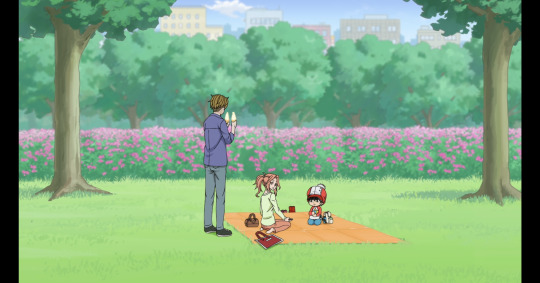
狩野:「美月さん、アイス食べます?…… あれ?」
“Hey, Mizuki. Would you like an ice cream cone? …… Hello?”
美月:「アイスをもらうけど私、狩野くん誘ってないんだよなぁ」
“While I appreciate the ice cream, you know you weren’t actually invited, Karino.”
コタロー:「お邪魔である」
“Interloper.”
邪魔 is a notoriously difficult word to translate, and the natural-sounding corresponding english phrase will vary quite wildly depending on the situation. In non-feudal lord speech, it usually gets translated to something like “you’re getting in my way” or “get out of here” or even “you’re a burden” (my least favourite).
Here, it’s creatively translated as “interloper”! A great way of sneaking in some archaic english while deftly handling a classically difficult-to-translate word.
コタロー:「わらわは写真が大の苦手なのだ」
“I am ill-disposed to having my picture taken!”
Here we have a slightly longer sentence which shows us a bit more of Kotaro’s unusual speech pattern. He uses the archaic first-person pronoun わらわ(妾)and often ends his sentences in なのだ. なのだ is not a particularly odd grammar structure to use, but it is unusual to use it unabbreviated (i.e. not shortening it to なんだ and/or adding よ to the end) especially when using it in speech rather than in writing. Not abbreviating it (as would be expected in a formal situation), but immediately contrasting that formality with the informal だ rather than です causes the speech to sound archaic without actually using any archaic vocabulary.
Now, if this show only translated the old-timey speech pattern well, I’d still call it a good translation. But the attention to detail and focus on natural sounding language extends to the other characters too!
Let’s take a look at an example of Karino’s speech. This is from ep 3; we already know a fair bit about who he is - a manga artist who doesn’t leave the house much (mostly works from home), usually wears comfortable clothes around, leaves things til the last minute and is generally a pretty lazy guy. I say this because the following translation doesn’t “work” (that is, the english and japanese wouldn’t mean the same thing) if it was spoken by a different kind of character.

phone rings
狩野:「担当さんかー」
“Oh great, it’s my editor”
狩野:「お疲れ様です、狩野です。… はい … 今日原稿を?はい、わかりました。じゃあ、後で」
“Hello, this is Karino. How may I help you? … Yes … Wait. Now, now? … Uh-huh, yes. Okay, thank you, I’ll be there soon.”
コタロー:「どこか行くのか?」 “Do you need to go somewhere?”
狩野:「仕事。出版社に行く。今回もダメ出しされんのかな?」
“Yeah, I gotta go to work. There goes my day. … I’m sure he’ll just rip it apart like he always does.”
狩野:「あの人結構グサグサ刺さる事言うんだよなぁ」
“The way he criticises, it’s actually pretty hurtful.”
I really like this translation, it feels very clever and results in very natural sounding english. I said this wouldn’t work for a different character, but I think even for the same character, this translation wouldn’t work on ep 1 - the audience wouldn’t have the context for the translation to omit the specific words it does and get away with it.
For example, the line 「今日原稿を?」 directly refers to a manga draft, but the draft isn’t directly referred to in the english. But it ends up being ok, because we can infer that he’s handing in some sort of draft for review from a later line (”I’m sure he’ll just rip it apart…”). Also, 「出版社に行く」 directly states that he’s going to the publishing house, but the english simply refers to it as “work”. But we can infer this too - he’s going to see his editor, and since most of his work is drawing and writing, which he does at home, we know that when he says he’s “going to work”, he’s actually going to the publishing offices.
Prioritising the natural sound of the script over the specific details is a bold choice that really pays off, imo. This is some of the most natural english I’ve ever seen in an anime translation. I recommend checking it out if you’re interested!
61 notes
·
View notes
Text
Really good anime translation: コタローは一人暮らし
I complained in a post a while ago about how I mostly think english translations of anime aren’t very good, and @japanwords asked me if there were any anime I know of that have good translations. I don’t actually watch that much anime so I didn’t have a good answer, but recently I found one that really fit the bill: 『コタローは一人暮らし』or “Kotaro lives alone”
For those who haven’t seen it, it’s a show about a 5 year old kid who lives alone without any parents or guardians, and makes friends with his neighbours in the apartment complex (a lazy manga artist, a woman who’s a hostess at a local nightclub, and a scary yakuza who finds Kotaro unbelievably cute). These friends end up helping Kotaro when he needs someone to act as a guardian, such as when he enrols at the local kindergarten.
The other thing you have to know about Kotaro is he speaks like a Japanese feudal lord.
This really is the crux of what makes the translation so good, because how the hell do you translate that?! The way they chose to do it is by using archaic english phrases. He kinda speaks like a Victorian era gentleman, and he sometimes even verges on sounding like a stereotypical medieval knight. This works perfectly, because Kotaro is actually imitating a character from his favourite cartoon: a samurai hero/feudal lord. Let’s look at some examples:
「放すである」
"Unhand me!"
A simple example to start with, I thought it might be interesting to compare how a 5 year old might actually say this, and how I would translate that:
「放してー!😭"」
"Let goooo! 😭"
Even though the japanese uses the same verb (放す), the english translation is completely different. The choice here to make it “unhand me” (much more evocative of a time period) instead of just “let go of me” (simply a longer way of saying it) is a perfect example of the care this anime puts into its translation.

狩野:「美月さん、アイス食べます?…… あれ?」
“Hey, Mizuki. Would you like an ice cream cone? …… Hello?”
美月:「アイスをもらうけど私、狩野くん誘ってないんだよなぁ」
“While I appreciate the ice cream, you know you weren’t actually invited, Karino.”
コタロー:「お邪魔である」
“Interloper.”
邪魔 is a notoriously difficult word to translate, and the natural-sounding corresponding english phrase will vary quite wildly depending on the situation. In non-feudal lord speech, it usually gets translated to something like “you’re getting in my way” or “get out of here” or even “you’re a burden” (my least favourite).
Here, it’s creatively translated as “interloper”! A great way of sneaking in some archaic english while deftly handling a classically difficult-to-translate word.
コタロー:「わらわは写真が大の苦手なのだ」
“I am ill-disposed to having my picture taken!”
Here we have a slightly longer sentence which shows us a bit more of Kotaro’s unusual speech pattern. He uses the archaic first-person pronoun わらわ(妾)and often ends his sentences in なのだ. なのだ is not a particularly odd grammar structure to use, but it is unusual to use it unabbreviated (i.e. not shortening it to なんだ and/or adding よ to the end) especially when using it in speech rather than in writing. Not abbreviating it (as would be expected in a formal situation), but immediately contrasting that formality with the informal だ rather than です causes the speech to sound archaic without actually using any archaic vocabulary.
Now, if this show only translated the old-timey speech pattern well, I’d still call it a good translation. But the attention to detail and focus on natural sounding language extends to the other characters too!
Let’s take a look at an example of Karino’s speech. This is from ep 3; we already know a fair bit about who he is - a manga artist who doesn’t leave the house much (mostly works from home), usually wears comfortable clothes around, leaves things til the last minute and is generally a pretty lazy guy. I say this because the following translation doesn’t “work” (that is, the english and japanese wouldn’t mean the same thing) if it was spoken by a different kind of character.

phone rings
狩野:「担当さんかー」
“Oh great, it’s my editor”
狩野:「お疲れ様です、狩野です。… はい … 今日原稿を?はい、わかりました。じゃあ、後で」
“Hello, this is Karino. How may I help you? … Yes … Wait. Now, now? … Uh-huh, yes. Okay, thank you, I’ll be there soon.”
コタロー:「どこか行くのか?」 “Do you need to go somewhere?”
狩野:「仕事。出版社に行く。今回もダメ出しされんのかな?」
“Yeah, I gotta go to work. There goes my day. … I’m sure he’ll just rip it apart like he always does.”
狩野:「あの人結構グサグサ刺さる事言うんだよなぁ」
“The way he criticises, it’s actually pretty hurtful.”
I really like this translation, it feels very clever and results in very natural sounding english. I said this wouldn’t work for a different character, but I think even for the same character, this translation wouldn’t work on ep 1 - the audience wouldn’t have the context for the translation to omit the specific words it does and get away with it.
For example, the line 「今日原稿を?」 directly refers to a manga draft, but the draft isn’t directly referred to in the english. But it ends up being ok, because we can infer that he’s handing in some sort of draft for review from a later line (”I’m sure he’ll just rip it apart…”). Also, 「出版社に行く」 directly states that he’s going to the publishing house, but the english simply refers to it as “work”. But we can infer this too - he’s going to see his editor, and since most of his work is drawing and writing, which he does at home, we know that when he says he’s “going to work”, he’s actually going to the publishing offices.
Prioritising the natural sound of the script over the specific details is a bold choice that really pays off, imo. This is some of the most natural english I’ve ever seen in an anime translation. I recommend checking it out if you’re interested!
61 notes
·
View notes
